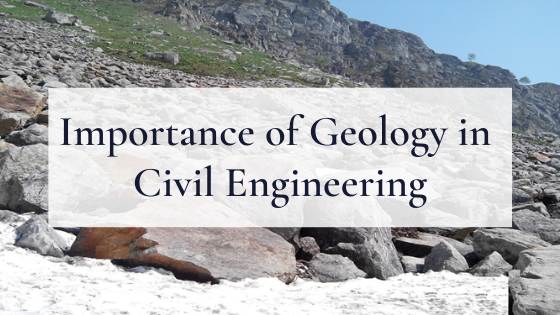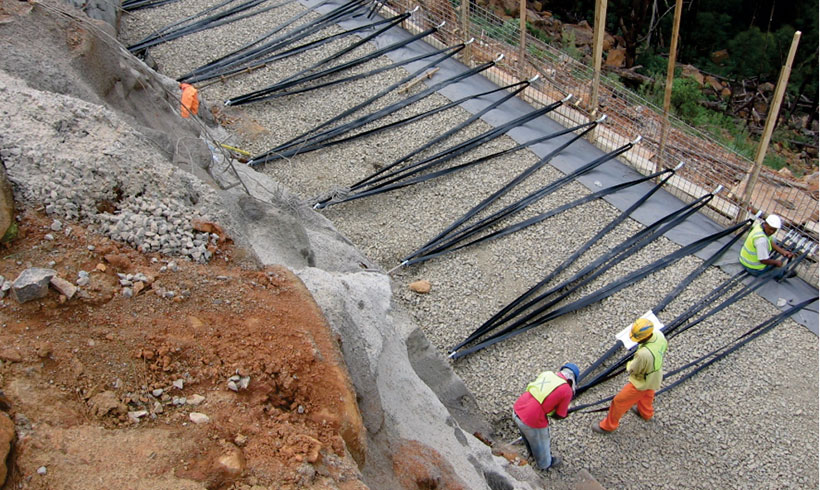The 2-Minute Rule for Specialized Geotechnical Engineering Solutions
The 2-Minute Rule for Specialized Geotechnical Engineering Solutions
Blog Article
Specialized Geotechnical Engineering Solutions for Dummies
Table of ContentsSpecialized Geotechnical Engineering Solutions for DummiesOur Specialized Geotechnical Engineering Solutions DiariesSome Of Specialized Geotechnical Engineering SolutionsSee This Report on Specialized Geotechnical Engineering Solutions
They conduct site investigations, accumulate samples, do research laboratory examinations, and assess information to review the suitability of the ground for construction projects. Based on their findings, geotechnical designers provide recommendations for foundation design, slope security, preserving frameworks, and mitigation of geotechnical dangers. They team up with various other experts, such as designers, architectural engineers, and construction teams, to ensure that geotechnical factors to consider are incorporated right into the total task style and application.
Foundation Design: Geotechnical engineers play an important function in creating foundations that can safely support the intended framework. They analyze the dirt conditions and load requirements to determine the suitable foundation kind, such as superficial foundations (e.g., footings), deep structures (e.g., stacks), or specialized methods like soil renovation. They take into consideration aspects such as settlement limitations, bearing capacity, and soil-structure communication to establish optimal structure layouts.
The Of Specialized Geotechnical Engineering Solutions
Below are some kinds of geotechnical designers: Structure Engineer: Structure engineers focus on making and analyzing structures for frameworks - Specialized Geotechnical Engineering Solutions. They analyze the soil problems, lots needs, and website features to figure out the most appropriate foundation kind and design, such as shallow foundations, deep structures, or specialized techniques like heap foundations
They execute field testing, accumulate samples, and examine the collected information to characterize the dirt residential properties, geologic formations, and groundwater conditions at a site. Geotechnical Instrumentation Engineer: Geotechnical instrumentation designers concentrate on tracking and determining the actions of soil, rock, and structures. They install and preserve instrumentation systems that keep track of variables such as dirt settlement, groundwater degrees, slope motions, and structural variations to assess efficiency and supply very early warnings of possible issues.
In the office setting, geotechnical designers use specialized software program tools to perform computations, create designs, and analyze data. Specialized Geotechnical Engineering Solutions. They prepare records, evaluation project requirements, connect with customers and team participants, and coordinate project activities. The workplace setup gives a conducive setting for study, analysis, and collaboration with other specialists involved in the project
They often check out job websites to perform website examinations, evaluate geotechnical conditions, and gather information for evaluation. These check outs include traveling to various places, occasionally in remote or difficult surfaces. Geotechnical engineers may do dirt tasting, conduct tests, and display building activities to make sure that the geotechnical facets of the task are being executed correctly.
Specialized Geotechnical Engineering Solutions Things To Know Before You Get This
Geotechnical designers also operate in specialized geotechnical research laboratories. In these centers, they conduct experiments, do examinations on soil and rock samples, and examine the design buildings of the materials. Geotechnical lab engineers function thoroughly in these environments, handling testing tools, running instruments, and recording information. They team up with other laboratory personnel to ensure accurate and dependable screening outcomes.
Retaining Walls: Creating walls that keep back soil to avoid landslides and provide stability on sloped surfaces. Embankments and Earthworks: Creating embankments for roads, trains, and dams to guarantee they remain stable under stress. The mining industry relies heavily on geotechnical engineering to ensure the safety and durability of its procedures.
With this in mind, we have actually designed our program to prepare trainees for success. The Geotechnical Engineering program at the University of Delaware uses chances for innovative research and study in: Dirt and rock technicians Soil-structure communication Constitutive modeling Computational geomechanics Foundation and earth frameworks engineering Ground enhancement Slope stability and landslide stablizing Liquefaction of dirts and earthquake design Laboratory characterization of geomaterials and dirt support Environmental geotechnics Given the solid demand for enhancement to our nation's infrastructurethe American Society of Civil Designers provided the U.S.
Geotechnical design is a branch of civil engineering; however, it entails making use of scientific methods and concepts to gather and translate the physical residential or commercial properties of the ground. Geotechnical designers are entailed in all phases of the style of frameworks, from principle to building. Their work is important in the layout and preparation process as they analyze the stability of soil, clay, silt, sand, and rock, prior to building and construction beginning.
Things about Specialized Geotechnical Engineering Solutions
This is followed by a ground examination Visit Website based on the findings of the workdesk research study and includes test matching and sampling to reveal any potential issues. Geotechnical engineers function within multidisciplinary teams, sustained by intermediate and younger designers along with by CAD service technicians. As a senior geotechnical engineer on a hydro plant task, jobs may consist of taking part in technological testimonials (e.g., peer evaluations), tailings dam evaluations, dam security testimonials, and other research studies connected to the layout and building and construction of mine waste facilities.
While some specialists specialise solely in geotechnics, others might work under titles like engineering geologist or ground designer within comparable abilities. As a geotechnical engineer, you'll require to: develop and keep relationships with customers and various other experts involved in the site, throughout each projectmaintain security standards on website bear in mind price ramifications when you make recommendationsstudy geological maps and aerial pictures from a variety of resources and from various time periodsexamine construction intends to see exactly how practical they are based on your understanding of the siteinvestigate risks or geological threats for the sitesearch for environmentally delicate functions, such as land fill begin to create you could check here accurate and interpretive ground modelsplan area investigationsdrill and analyse samples of bedrock, dirt, groundwater and additional materials oversee other professionals on sitesolve technical concerns as they arise, such as unanticipated frameworks at drill sitesmonitor conditions during and after building to ensure structures are steady in the short and lengthy termadd data gathered on site to your first researchcreate geotechnical computations, find out drawings, and 2 or three-dimensional computer system versions analyzing the datamake suggestions regarding the proposed usage of the site.
There are whole lots of chances to meet new people, as you'll collaborate with a variety of specialists at every website. The job can be stressful as you might be liable for the safety and security of others while on website. There is likewise a high degree of economic responsibility, as the referrals you make can have significant cost effects.

Report this page